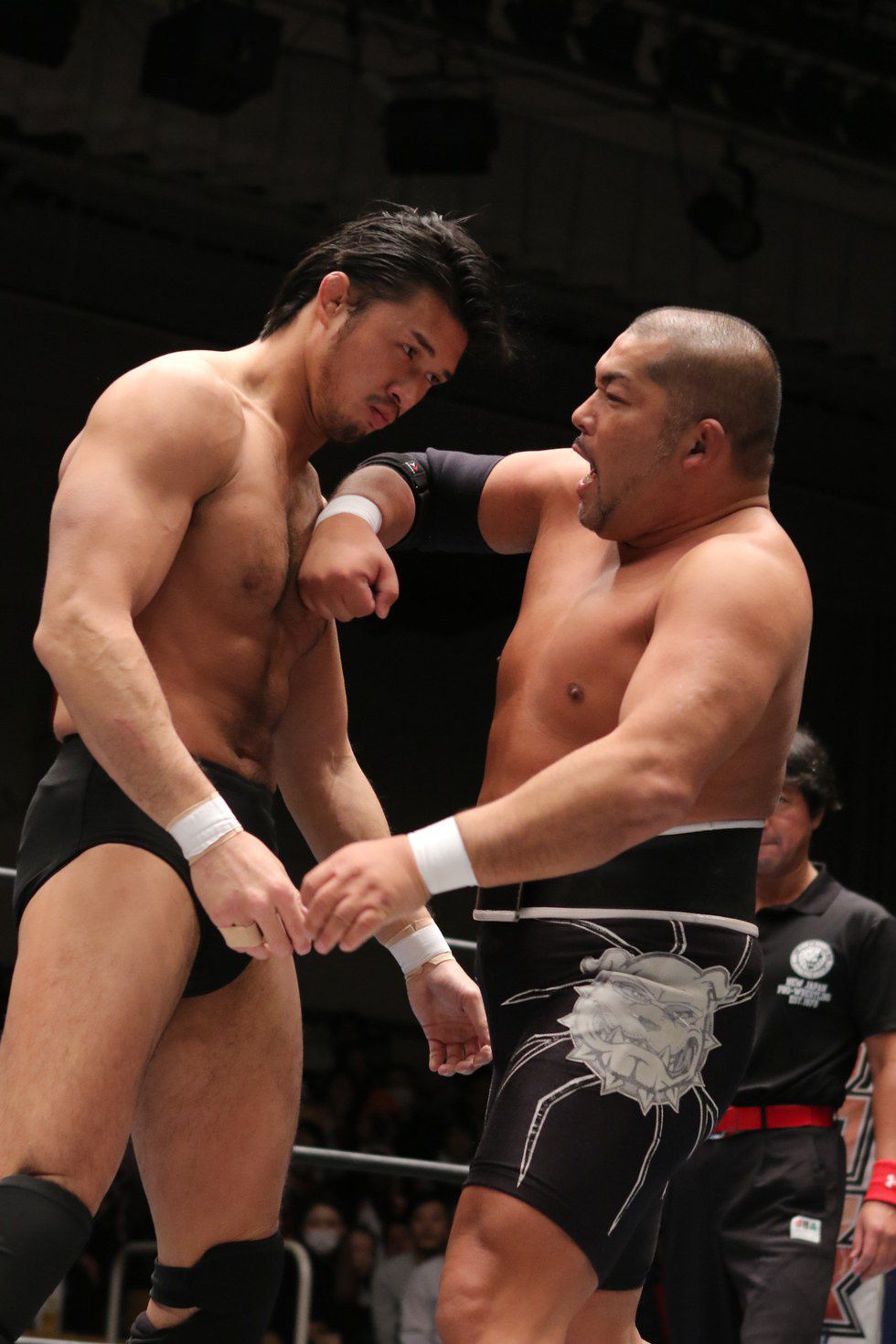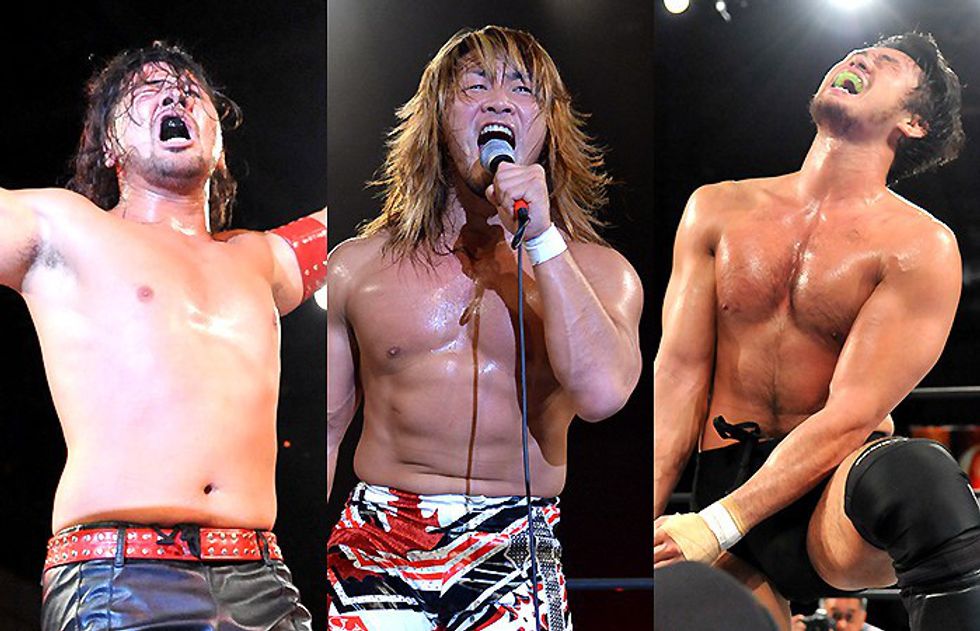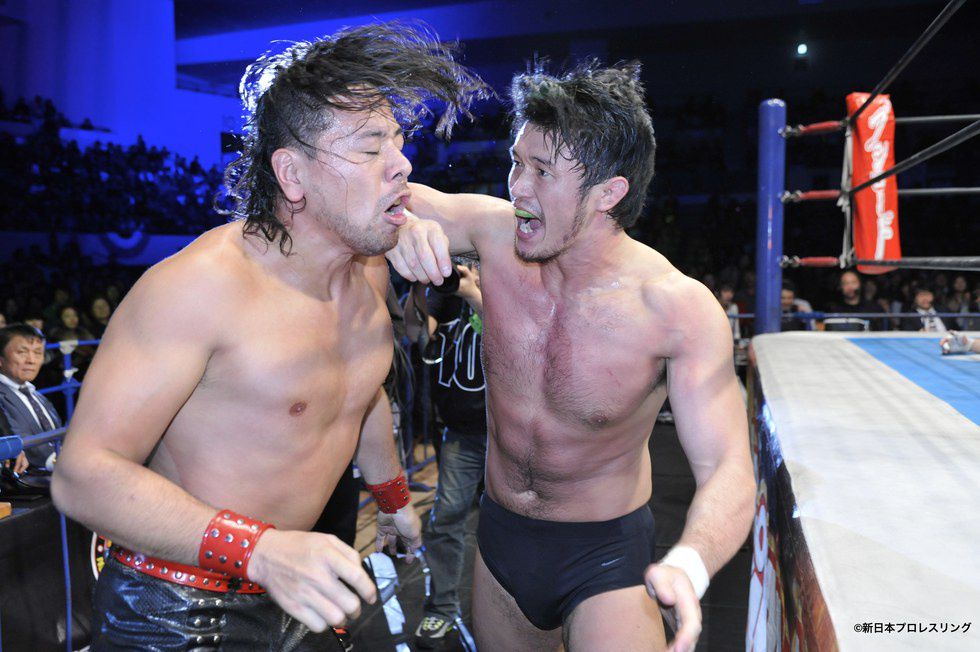On AXS TV, a new breed of pro wrestling has appeared. Well, not entirely new, but to the American audience, Japanese pro wrestling, affectionately nicknamed “Puro,” is a different animal from the showmanship that WWE presents. New Japan Pro Wrestling (NJPW), established in 1972, now has a television deal in the United States, finding its home on AXS TV, a channel that primarily thrives on live concerts and combat sports. But where does the pseudo-fictional world of puro fit in?
It fits in under the namesake of Strong Style, a sect of wrestling that emphasizes hard-hitting athleticism over taunts and gestures. NJPW is the biggest wrestling promotion in Japan and being on AXS TV, many stars from the organization now have a bigger vehicle to spread their name. Amongst those stars are Hiroshi Tanahashi, the icon and the poster child of NJPW, Shinsuke Nakamura, the eccentric individual who oozes charisma, and Kazuchika Okada, the new ace groomed to lead the company into a new peak.
However, left out of that trio is the dark horse of NJPW, Katsuyori Shibata. Originally tagged as being one of the new stars for the company in 2005, Shibata hastily left the promotion due to being unhappy and soon, after doing a few matches for rival organizations, entered a lackluster career in mixed martial arts. Seven years later, he returned to world of pro-wrestling and has stayed ever since. But with that long of a departure, fans of Shibata question whether his status as a star, his status as an ace can be reclaimed.
Mauro Ranallo, lead commentator for the NJPW AXS TV show, dubs Shibata, Tanahashi and Nakamura as the “triumvirate of New Japan Pro Wrestling," naming them the New Three Musketeers. For those not in tune with this moniker, in the context of wrestling, it is referring to how Keiji Mutoh, Shinya Hashimoto and Masashiro Chono ruled the era of and changed the landscape of NJPW in the 1990s. They were the three top guys that became the biggest box office draws for the promotion at the time. This surge in popularity led New Japan to become a global juggernaut with that trio at the helm.
Fast forward to the 2000s. The original Musketeers had dropped out of the spot light. New stars were tapped to be elevated to the main event. However, NJPW faced a steep decline in popularity. The promoter at the time, Antonio Inoki, famed for facing Muhammad Ali in a controversial fight, primarily relied on the star power of mixed martial arts (MMA) fighters rather than the actual wrestlers that they had on hand. The strategy to reinvigorate the company to maintain its peak did not last and fans saw through the opaque facade and turned away from the MMA centric route that NJPW took. Throughout Inoki’s methods and inconsistencies with maintaining the fanbase, New Japan continued on a slump until 2005, when Yuke’s, a video game company famed for developing many of the WWE Smackdown games, bought 51 percent of the shares for NJPW, effectively taking away majority power from Inoki, who soon left to form his own company. Under new management, New Japan began its stride for rejuvenation.
In the scorched earth that documented the reign of Antonio Inoki, no new, homegrown stars were in line to become the faces of the promotion for the years to come. However, in the background of all the chaotic decisions were the New Three Musketeers: Hiroshi Tanahashi, Shinsuke Nakamura, and Katsuyori Shibata. The trio became the potential leaders for the new generation once Antonio Inoki’s rule had come to an end. Until 2005, they were not the focus for a long time and once new blood had taken over, the trio’s time to shine and bring NJPW back from its slump became nigh.
But 2005 comes around. Inoki leaves and in an unexpected move, Katsuyori Shibata, a New Three Musketeer, abruptly leaves the promotion as well.
Three aces emerged and one left during the time that a company needed as much star power as it could get. From those aces, two became major mainstays and popular icons in NJPW and one worked matches for rival companies and later attained a lackluster record of three wins and 10 losses doing mixed martial arts.
Seven years later, Katsuyori Shibata returns to NJPW, but did his departure take too long? During Shibata’s absence, fellow Musketeer, Hiroshi Tanahashi became a five time heavyweight champion and the poster boy for NJPW. During Shibata’s absence, Shinsuke Nakamura became a three time heavyweight champion and the most charismatic entity in the current world of pro-wrestling.
Now, with Shibata back in NJPW, his portrayal as a top star may be derailed mostly of the stigmata against him for leaving 10 years ago. In his book, "Why Hiroshi Tanahashi Was Able To Change NJPW," Hiroshi Tanahashi remarked about Shibata:
“Only if [Shibata] would have stayed in NJPW and worked together with [Nakamura and me] to make things better... I’m fully aware of the reason why he couldn’t come to enjoy wrestling at that time, and that he left the company after much agonizing. So on the other hand, I feel happy for what he’s said. But I found his last word in NJPW ‘I’m not going to be a white-collar (yes-man) wrestler’ offensive.”
For leaving in the midst of chaos, Shibata appears to be held back by New Japan management now as punishment for his departure 10 years earlier. But, is that part of the whole plan? Does NJPW have a plan in place to shift him to become a face for the promotion? Did they even have a definite plan for him when he left? There’s a sense of mystique around the enigma of Shibata that is intriguing to see play out as a fan.

So if Katsuyori Shibata never left, would he be a huge star for New Japan right now?
I would say yes. With Tanahashi, you have the entertainer with flashy moves and glowing charisma. With Nakamura, you have another charismatic entertainer with hard hitting moves and engaging theatrics. With Shibata, you have the fighter that kicks the tar out of people while fans eat it up. No taunts needed. No showmanship required. All three together, you have a trio that can satisfy the different segments and different desire of wrestling fans. If Shibata never left, I believe NJPW would've gotten out of its slump much faster. If Shibata never left, I truly believe that he would be an icon for NJPW right now.
I love the man. His style is vicious and believable and his hair stays in the place the entire match. There's a no nonsense attitude about the guy that I love so much. To me, he should have been a heavyweight champion by now.
It may be years until he reaches the same popularity and same star power as Tanahashi and Nakamura. Hell, he may never get there at all. Right now, he's the Ace that never was. But don't count him out at all. I firmly believe that he'll be an icon for NJPW sooner than later.










 The minimum wage is not a living wage.
StableDiffusion
The minimum wage is not a living wage.
StableDiffusion
 influential nations
StableDiffusion
influential nations
StableDiffusion












